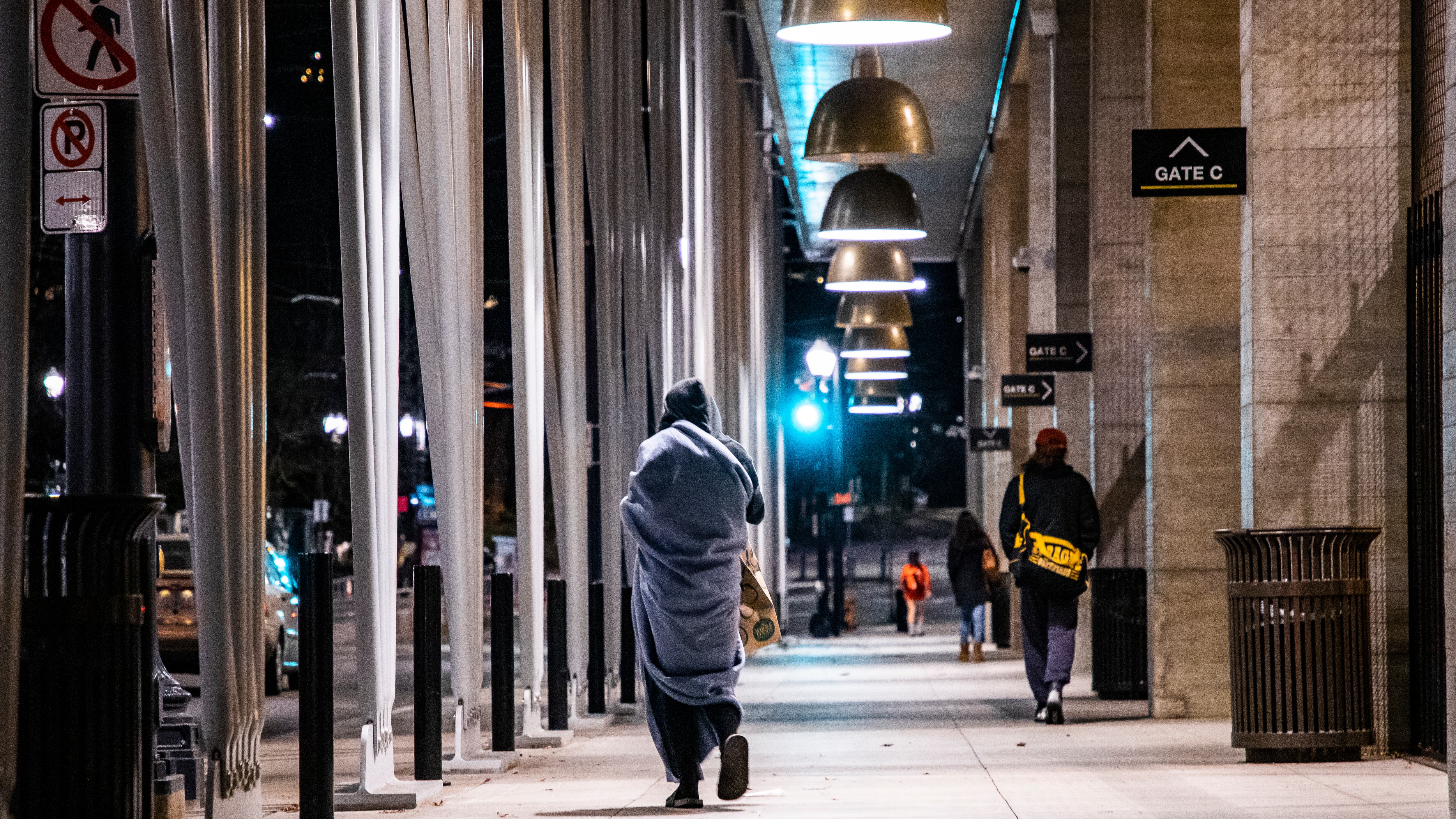Providence Park reopened this fall after $85 million in renovations, with 4,074 new seats for Timbers and Thorns fans, new snack bars for Hot Lips Pizza and Podnah's Pit, and an outdoor concourse over Southwest 18th Avenue.
That last feature also created a warm, dry portico on the sidewalk—and set off alarm bells in Portland City Hall about the alcove's potential as a homeless camping spot.
And for more than a year, city officials have been working on a way to keep homeless people away from the soccer stadium, according to a document obtained by WW.
The result of that effort? A draft of a new city ordinance, also obtained by WW, that would prohibit sitting or lying down, erecting structures, including tents or shanties, or receiving any kind of payment on the sidewalks outside popular downtown event spaces—and not just Providence Park.
Last week, an official with the Portland Bureau of Transportation briefed members of a local homeless advocacy workgroup on the scope of the proposed ordinance. PBOT says the draft ordinance would cover multiple locations, specifically sidewalks around publicly owned event spaces. Those would include Arlene Schnitzer Concert Hall and performance venues along Southwest Broadway.
Federal case law prohibits cities from imposing blanket bans on sleeping outdoors. But the city has prohibited camping in parks and along specific high-traffic areas downtown and the pedestrian plaza Ankeny Alley, adjacent to Voodoo Doughnut. The Event Space designation would expand those no-sit zones.
When WW asked questions this week, several city officials—including the office of Mayor Ted Wheeler—claimed ignorance of the plan, and the commissioner overseeing PBOT disavowed the idea.

But Jordan Schnitzer, a prominent investor whose mother's name is on the concert hall, says it's a sound plan. "If people are fearful of being approached on the street," he tells WW, "then it's in the city's interest to help support cultural institutions that provide hundreds of jobs and help create quality of life in Portland that we all enjoy."
According to the draft ordinance, the new regulations are intended to manage traffic and pedestrians and enforce security in areas around popular event spaces.
The plan emerges the same week Salem city officials considered—then abandoned—an ordinance to restrict sitting or lying on city sidewalks.
As with other city efforts to strike a balance between care for people living on the streets and a welcoming environment at downtown attractions, the Portland proposal has sparked controversy.
Advocates raised objections—at the meeting and afterward. "It's another example of criminalizing homelessness," says Barb Rainish, who attended the meeting and serves on the Disability Services Advisory Council as a community advocate for the homeless. "I don't understand what the point is, in a way, because I don't think it's a big deterrent. It's just another ticket and essentially another court date and another fine somebody can't pay."
"[They] are going to exclude and be very detrimental to our vulnerable population of people who live on the streets and people within poverty altogether," adds Art Rios Sr., an advocate for the homeless who attended the meeting.
One elected official already says she wants nothing to do with the plan. City Commissioner Chloe Eudaly, who oversees the Portland Bureau of Transportation, says she was unaware of her employee's involvement until WW started placing calls on the issue.
Eudaly says she has since directed the bureau to stop work on the ordinance.
"It's my understanding that camping hasn't been much of an issue in this area, so I'm not sure why this is necessary," Eudaly says. "Regardless, policies that target members of our houseless community are antithetical to my values. PBOT won't be participating in this process any further."
The ordinance's prospects now appear dim. Wheeler's office said it hadn't seen the ordinance, and the Portland Office of Management and Finance—which helped draft the proposal—said it was not "interested in pushing it any further."
The Timbers and the Thorns declined to comment.

Documents reviewed by WW show the city proposed a camping and sitting exclusion around entertainment venues. The documents say the policy was created by the City Attorney's Office, the Police Bureau and the Spectator Venues Program—with Providence Park specifically in mind.
"During the approvals process for the [Providence Park] expansion project, City Council raised concerns that this new, large covered sidewalk that will be lightly used much of the time, has the potential to attract unwanted activities, such as homeless camping," reads a document from September 2018. "While the first Event Space will be established around the stadium, the code is written to allow Council designation of additional Event Spaces in the future should the need arise."
Portland police would be tasked with enforcing the new policy, with warnings, citations and exclusions. Exclusions from the defined areas could last up to six months.
Portland has a long history of trying to establish exclusion zones and "no sitting or lying down" policies, but citizens have often responded with protests and legal action.
In the 1990s, the Portland City Council established drug- and prostitution-free zones, which an outside study found discriminated against black residents. These findings were one reason then-Mayor Tom Potter allowed the ordinances to expire in 2007.
Throughout the 2000s, the city of Portland tried numerous times to establish laws against loitering on public sidewalks, known as sit-lie laws. The policies resulted in large protests and, when challenged in court, were found unconstitutional.
Yet City Hall remains beset by complaints from downtown businesses. Last week, WW reported on the city's move to require social service permits for charity organizations after downtown businesses complained about the volunteer group Free Hot Soup, which feeds the homeless in Director Park ("No Soup for You," WW, Nov. 20, 2019).
Homeless advocates argue that because many of Portland's homeless services are consolidated downtown, the new code would negatively affect people looking to access severe-weather shelters, food services, and drug and alcohol treatment centers.
"If you start mapping out a lot of those things around the theaters and Providence Park," says Rios, "you would see all the different services that would be around there for people who need to utilize them."

